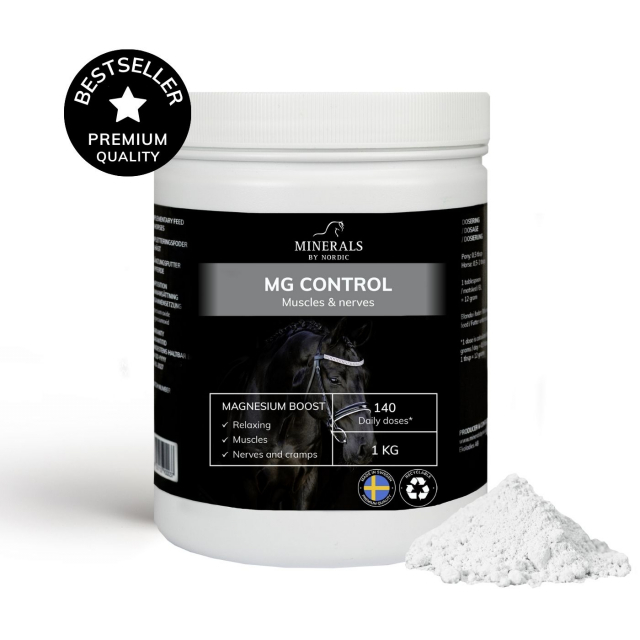
Do horses need magnesium supplements?
Magnesium is an essential mineral that plays a crucial role in a horse's overall health. It is necessary for several biological processes, including muscle function, nerve function, and is critical for energy production. A deficiency in magnesium can lead to a range of health issues, such as muscle weakness, nervousness, and intolerance to physical exertion.
Symptoms of magnesium deficiency in horses
The symptoms of magnesium deficiency can vary depending on the severity of the deficiency. Common signs include irritability, muscle twitching, increased sensitivity to sounds and movements, and problems with focusing. Horses suffering from magnesium deficiency may also show signs of physical stress, such as being overexerted after normal activities. Another sign can be shaky muscles and cramping.
.jpg)
Administering magnesium supplements to horses can help improve their muscle function and nervous system. It can also aid in stabilizing the horse's mood and reducing stress reactions. A high-quality magnesium supplement ensures that horses receive the necessary amount of this vital mineral, which is crucial for their well-being and performance.
Benefits of magnesium for sugar-sensitive horses and horses with laminitis
Providing extra magnesium to sugar-sensitive horses and those suffering from laminitis can be beneficial for several reasons:
- Insulin regulation: Magnesium plays a role in insulin metabolism. It helps to improve insulin sensitivity, which is crucial for sugar-sensitive horses and those with metabolic diseases such as Equine Metabolic Syndrome (EMS). Better insulin regulation can help reduce the risk of laminitis, a severe condition often associated with insulin resistance.
- Prevention of laminitis: Laminitis is a painful inflammation of the hooves often linked to nutritional issues like overconsumption of carbohydrates. Magnesium can help stabilize blood sugar levels and reduce inflammatory responses, which can be beneficial for horses prone to developing laminitis.
- Reduced stress and inflammation: Magnesium has calming properties and can help reduce stress, which is particularly important for horses with laminitis as stress can exacerbate their condition.
- Improved circulation: Magnesium helps to dilate blood vessels, which can improve circulation. This is crucial for horses with laminitis as enhanced circulation can help reduce pain and inflammation in the hooves.
How magnesium can help tense and nervous horses
Magnesium can be incredibly helpful for tense and nervous horses in several ways:
- Nervous system function: Magnesium plays a critical role in the function of the nervous system. It helps regulate nerve impulses and can reduce overactivity in the nervous system. This can be especially useful for horses that are nervous or tense, as it can contribute to a more relaxed and calm behavior.
- Muscle relaxation: Magnesium is essential for muscle relaxation. It helps regulate the flow of calcium in and out of muscle cells, which is necessary for muscle contraction and relaxation. For tense horses, adequate magnesium intake can help reduce muscle tension and stiffness.
- Stress management: Magnesium is known for its calming properties. It can help reduce the stress response in horses by supporting the production and function of neurotransmitters involved in relaxation and well-being. This can be particularly beneficial for horses that are sensitive to stressors in their environment.
- Improved rest and recovery: Magnesium intake can contribute to better sleep quality. For tense and nervous horses, this could mean improved rest and recovery, which is crucial for their overall well-being.
- Improved mood and focus: By helping to stabilize mood and enhance concentration ability, magnesium can make horses less reactive and more focused, which is especially useful in training and handling.
.jpg)
Magnesium dosage
Horses obtain magnesium from roughage, but sometimes they need more than what roughage provides. According to SLU, the maintenance requirement is based on the body containing about 0.05% Mg. Loss through feces and urine is about 0.6 g/100 kg body weight. Horses that sweat a lot also lose Mg through sweat, which can increase the need if your horse is in training. The requirement for magnesium is 1.5-3 grams per 100 kg body weight. Overdosing is rare but can lead to diarrhea and urinary problems. Veterinarians and equine nutrition experts can provide advice on the correct dosage based on the horse's size, age, and general health condition.
Choosing the right magnesium
There are many different types of magnesium supplements on the market. Carefully read what the container actually contains and which type of magnesium source it is. We recommend Mg Control, which is 100% high-quality magnesium oxide.
Why is magnesium oxide a good source of magnesium for horses?
Magnesium oxide is a popular and effective source of magnesium for horses for several reasons. Magnesium oxide is the richest source of magnesium, containing about 60% elemental magnesium, while other sources such as magnesium citrate contain only 16% elemental magnesium. This means that, for example, to reach the daily recommended intake of 375 mg of magnesium for a human, one would need to take 625 mg of magnesium oxide, whereas one would need to take a whole 2344 mg of magnesium citrate to achieve the same dose. This means that several capsules of the citrate form must be taken, which often also means a higher price.
High magnesium content: Magnesium oxide contains a high proportion of magnesium compared to other forms, making it a concentrated source. This is especially advantageous for horses that need a higher intake of magnesium to meet their nutritional needs.
Biologically available: Although there are some discussions about bioavailability, magnesium oxide is generally considered to be relatively bioavailable for horses. This means that the magnesium can be absorbed and used effectively by the horse's body.
Economical: Magnesium oxide is often more economical compared to other magnesium supplements. This makes it a popular choice for horse owners looking for a cost-effective way to add magnesium to their horses' diets.
Reduced risk of diarrhea: Unlike some other magnesium sources, such as magnesium sulfate (Epsom salt), magnesium oxide has a lower risk of causing diarrhea when given in recommended doses.
How effective is magnesium oxide for horses?
Magnesium oxide is one of the best sources of magnesium when it comes to absorption into the cells. Much of the information available on the internet has uncritically built its conclusions on short-term urine tests. A major issue with this is that magnesium oxide is absorbed more slowly into the body, and therefore short studies are not applicable. Next, most of the magnesium in the body is not in the blood (which is excreted in the urine) but in tissues and cells. The correct way to investigate how effectively a source of magnesium is absorbed into the body is through biopsies (tissue samples). In such studies, magnesium oxide has shown as good and even better results than, for example, magnesium citrate.
FAQ: Magnesium for horses
What is magnesium and why is it important for horses?
Magnesium is an essential mineral that plays a crucial role in the health of horses. It is vital for nerve and muscle function, heart health, and supports a strong skeleton.
How effective is magnesium oxide for horses?
Magnesium oxide is one of the best sources of magnesium in terms of cellular uptake. Much of the information available on the internet has uncritically built its conclusions on short-term urine tests. A major issue with this is that magnesium oxide is absorbed more slowly into the body, and therefore short studies are not applicable. Additionally, most of the magnesium in the body is not in the blood (which is excreted in the urine) but in tissues and cells. The correct way to investigate how effectively a source of magnesium is absorbed into the body is through biopsies (tissue samples). In such studies, magnesium oxide has shown as good and even better results than, for example, magnesium citrate.
What are the signs of magnesium deficiency in horses?
Signs of magnesium deficiency may include nervousness, muscle spasms, difficulty relaxing, hypersensitivity to sound or movement, and in severe cases, heart problems.
How do horses get magnesium?
Horses obtain magnesium through their diet, which typically includes grass, hay, and special feed supplements that are rich in magnesium.
How much magnesium does a horse need daily?
The daily magnesium requirement varies depending on the horse's size, age, activity level, and overall health condition. The need is 1.5-3 grams per 100 kg body weight, according to SLU.
Can horses get too much magnesium?
Yes, although it is rare, too much magnesium can lead to loose stools.
How do I choose a good magnesium supplement?
Choose a supplement specifically formulated for horses, with appropriate dosing and without unnecessary additives. We recommend magnesium oxide as a source of magnesium.
Can magnesium affect the behavior of horses?
Yes, magnesium plays a role in the function of the nervous system and can affect the behavior of horses. Horses with sufficient magnesium in their bodies are often calmer and more focused.
Do competition horses need more magnesium?
Competition horses, due to their high activity level and stress, may need higher levels of magnesium. Their diet should be monitored carefully to ensure adequate intake.

 SWE
SWE
 ENG
ENG NO
NO AX
AX DE
DE